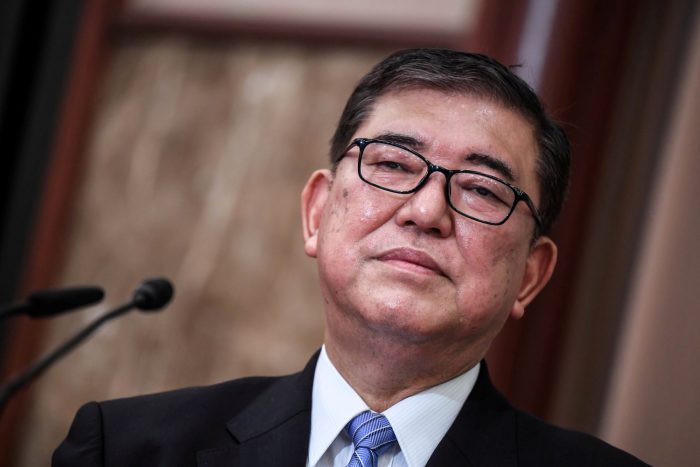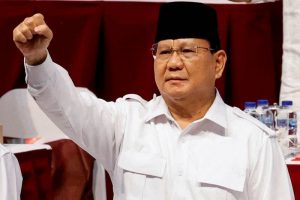The ruling coalition in Japan lost control of the upper house in an election on Sunday, leaving the country’s political leadership in a state of flux as it seeks to negotiate a tariff deal with the United States.
While Prime Minister Shigeru Ishiba’s grip on power has been weakened, he vowed to remain party leader.
The ballot does not directly determine whether Ishiba’s administration will fall, but it heaps pressure on the embattled leader, who lost control of the more powerful lower house in October.
ALSO SEE: China Starts Work on Huge Dams in Tibet Opposed by Neighbours
Ishiba’s Liberal Democratic Party (LDP) and coalition partner Komeito returned 47 seats, short of the 50 seats it needed to ensure a majority in the 248-seat upper chamber in an election where half the seats were up for grabs.
That comes on top of its worst showing in 15 years in October’s lower house election, a vote which has left Ishiba’s administration vulnerable to no-confidence motions and calls from within his own party for leadership change.
Speaking late on Sunday evening after exit polls closed, Ishiba told NHK he “solemnly” accepted the “harsh result”.
“We are engaged in extremely critical tariff negotiations with the United States…we must never ruin these negotiations. It is only natural to devote our complete dedication and energy to realizing our national interests,” he later told TV Tokyo.
Asked whether he intended to stay on as premier, he said “that’s right”.
Japan, the world’s fourth largest economy, faces a deadline of August 1 to strike a trade deal with the United States or face punishing tariffs in its largest export market.
The main opposition Constitutional Democratic Party finished second with 22 seats.
Meanwhile, the far-right Sanseito party announced its arrival in mainstream politics, adding 14 seats to one elected previously. Launched on YouTube a few years ago, the populist party found wider appeal with its ‘Japanese First’ campaign and warnings about a “silent invasion” of foreigners.
Households want tax cuts
Opposition parties advocating for tax cuts and welfare spending struck a chord with voters, as rising consumer prices – particularly a jump in the cost of rice – have sowed frustration at the government’s response.
“The LDP was largely playing defence in this election, being on the wrong side of a key voter issue,” David Boling, a director at consulting firm Eurasia Group, said.
“Polls show that most households want a cut to the consumption tax to address inflation, something that the LDP opposes. Opposition parties seized on it and hammered that message home.”
The LDP has been urging fiscal restraint, with one eye on a very jittery government bond market, as investors worry about Japan’s ability to refinance the world’s largest debt pile. Any concessions the LDP must now strike with opposition parties to pass policy will only further elevate those nerves, analysts say.
“The ruling party will have to compromise in order to gain the cooperation of the opposition, and the budget will continue to expand,” said Yu Uchiyama, a politics professor at the University of Tokyo.
“Overseas investors’ evaluation of the Japan economy will also be quite harsh.”
Far right party
Sanseito, which first emerged during the Covid-19 pandemic spreading conspiracy theories about vaccinations and a cabal of global elites, is among those advocating fiscal expansion.
But it is its tough talk on immigration that has grabbed attention, dragging once-fringe political rhetoric into the mainstream.
It remains to be seen whether the party can follow the path of other far-right parties with which it has drawn comparisons, such as Germany’s AfD and Reform UK.
“I am attending graduate school but there are no Japanese around me. All of them are foreigners,” said Yu Nagai, a 25-year-old student who voted for Sanseito earlier on Sunday.
“When I look at the way compensation and money are spent on foreigners, I think that Japanese people are a bit disrespected,” Nagai said after casting his ballot at a polling station in Tokyo’s Shinjuku ward.
Japan, the world’s fastest aging society, saw foreign-born residents hit a record of about 3.8 million last year.
That is still just 3% of the total population, a much smaller fraction than in the United States and Europe, but the result comes amid a tourism boom that has made foreigners far more visible across the country.
- Reuters with additional editing by Jim Pollard
ALSO SEE:
South Korea, India and EU Scramble to Avoid 20-30% US Tariffs
Japan, South Korea Desperate to Reduce 25% Tariff by August
Japan’s PM Defends National Interest as Trump Ramps up Threats
China Fears Negative Impacts of US Trade Pact With Vietnam
Countries Should Not Sign Trade Deals at Our Expense: China
Carmakers Stressed by China’s Curbs on Critical Mineral Exports
Japan Says It’s In No Rush For A Trade Deal With The US
Japan Tells US: No Trade Deal Unless Auto Tariffs Reviewed
Japan May do Pipeline, Energy Deals to Appease Trump























